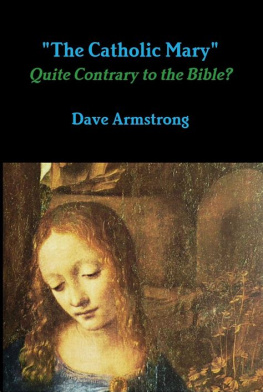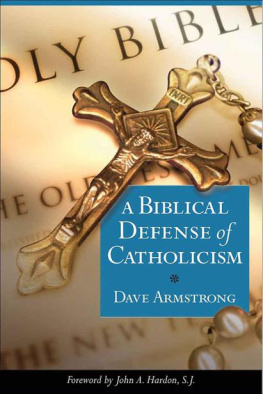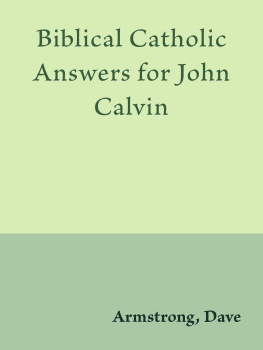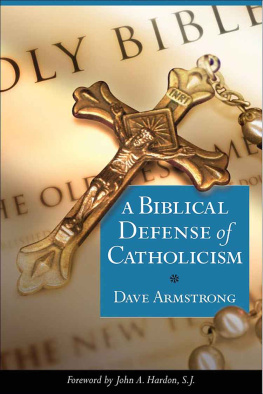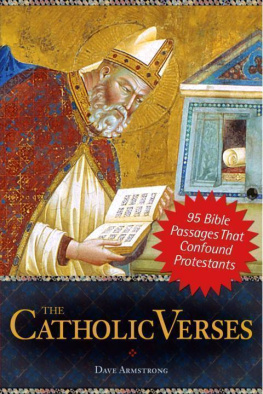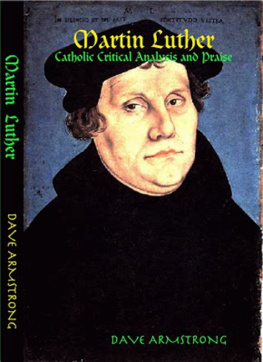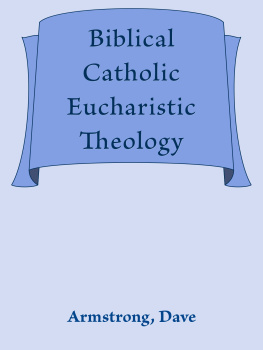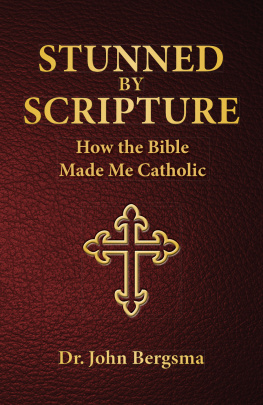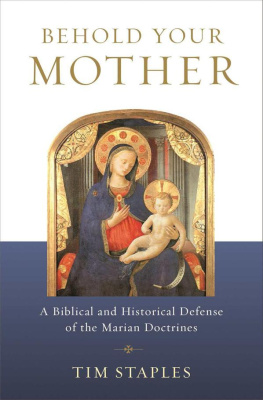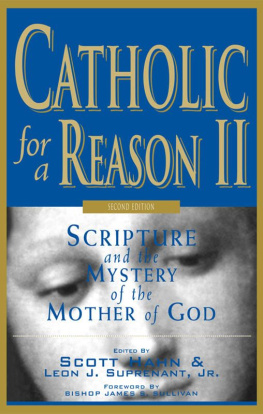Dave Armstrong
The Catholic Mary:
Quite Contrary to the Bible?
Copyright 2010 by Dave Armstrong
All rights reserved.
Biblical citations are from the Revised Standard Version of the Bible ( 1971) copyrighted by the Division of Christian Education of the National Council of the Churches of Christ in the United States of America. All emphases have been added.
For related reading on the authors blog, see:
Mary: The Blessed Virgin
http://socrates58.blogspot.com/2006/11/mary-blessed-virgin-index-page.html
DEDICATION
To Our Lady: Gods sublimely exalted, grace-filled creature, the
most exquisite disciple of Christ, and altogether worthy of honor
and emulation.
Chapter One
Marys Carol (A Christmas Poem)
[for the biblical background (that Ive taken great pains to closely follow), see: Luke 1:2656; 2:120, 35]
I was just a young, poor girl from Nazareth in Galilee; To Joseph betrothed; descended from King Davids line. Obedient to Moses and Yahwehs holy laws were we; Seeking in all our ways and acts to follow the Will Divine.
The glorious angel Gabriel suddenly one day appeared; Speaking solemnly in troubling and confusing ways. With words causing great awe, confusion, even fear: Why hail me as O favored one and full of grace?
I was told that I was chosen to bear a special Son, A great man: the righteous Son of the Most High. Inheritor of Davids throne and higher than everyone; Reigning over Jacob, with His Fathers kingdom nigh.
The Holy Spirit was to overshadow me like a cloud; My precious child was all-holy; Gods only begotten. What did that mean?, I wondered; yet not out loud; Trembling, pondering a message not soon forgotten.
To Gabriel I said I was the lowly handmaid of the Lord; Whatever God wanted, I was happy and willing to do. I resolved to let it be to me according to your word; I embraced the luminous vision of Gods holy gospel anew.
I visited my kinswoman Elizabeth, in Judaean hills far away; The prophet John the Baptist did leap for joy in her womb. He would prepare the way for Jesus on that wonderful Day: The healer of the blind, Who raised the dead from the tomb.
Elizabeth, filled with the Holy Spirit, praised this lowly maid; Calling me blessed among women, carrying a blessed child. I was even the mother of her Lord,is what she said; I kept these things in my heart, astonished all the while.
Then my soul praised God: magnifying His name and deeds, Rejoicing that He saved me by grace from a certain fate. Marveling at how He had always filled His peoples needs, From generation to generation: Abraham up to that date.
The night I bore my Lord Jesus is always clear in my mind; No inn or house in sight; just a cold, dusty (but dry) cave. Even the beasts understood, and were so gentle and kind; The Lord of Lords was now with us, to seek and to save.
Angels sang of glad tidings; curious shepherds came to seeAfter hearing loud heavenly choruses of great peace and joyThe King of kings, Davids heir, and carpenters son of Galilee. God had become man: the eternal Creator was a baby boy!
Then I quietly meditated on the divine mission my child had; Though my soul be pierced; by His death wed reach heaven. But I accepted this: Gods love and mercy made me so glad; For this divine plan my body and soul I have joyfully given.
Chapter Two
Marys Knowledge of Jesus Divinity
What did Mary know about Jesus, after being informed by an angel that she would be overshadowed by the Holy Spirit and bear the Son of God? The Catholic Church teaches that the Holy Spirit revealed to Mary all of this knowledge from the beginning of the Annunciation. Simeons prophecy perhaps informed her (if she didnt know it already) of another aspect of her role as the Mother of God: that a sword would pierce her heart (Luke 2:2535).
Fr. William Most writes:
The traditional view holds that Mary did know the divinity of Christ at the time of the Annunciation. This view is still held today by not only the best theologians, but also by the best Scriptural scholars.
Would God ask her to consent in the name of the whole human race, and still withhold from her knowledge of that to which she was consenting?
We are not permitted to give Holy Communion to children who do not know what they are receiving. Would Mary be given this far greater Communion in ignorance of what she was receiving? She did know that her Son was to be divine.
( Mary in Our Life , Garden City, New York: Doubleday Image, 1963 [originally 1954], 278, 280281)
This follows straightforwardly from what we know the angel Gabriel told the Blessed Virgin in the Annunciation. Marys knowledge of Christs divinity from that time on is, therefore, an explicitly biblical teaching:
He will be great, and will be called the Son of the Most High; and the Lord God will give to him the throne of his father David, and of his kingdom there will be no end the child to be born will be called holy, the Son of God.
(Luke 1:3233, 35)
Apart from the messianic implications (it can be shown that the Messiah was divine, through cross-referencing in the Old Testament alone; for example, Isaiah 9:67), the fact that Jesus was called (by an archangel) Son of God was sufficient to establish His deity or divinity or Godhood. We know this from John 5:1718, where Jesus called God the Father My Father.
The Jews then sought to kill Him for blasphemy, because, as St. John tells us, He called God his own Father, making himself equal with God (5:18). This is how Son of God was understood in the Jewish mind. Roughly the same thing occurs again in the record of John 10:2233 (and at that time He also added I and the father are one10:30).
Neither Jesus nor Mary grew in awareness or gradually figured out Who He was. Such a teaching is theological liberalism and heterodoxy. Jesus knew all along what would happen (including His Resurrection; see, for example, Matthew 16:2123; Mark 8:3133; Luke 9:2122. The Gospels present one harmonious presentation of Jesus: the real Jesus of verifiable history. The four accounts complement each other.
Furthermore, Marys knowledge was confirmed when she visited Elizabeth, mother of John the Baptist, who called her the mother of my Lord (Luke 1:43). Right after that passage, we see Mary praising God in the famous Magnificat (Luke 1:4655) because she was to be the mother of the Son of God, the Messiah, God the Son, God incarnate: which is precisely why she has been called blessed (Luke 1:48). She quite obviously knew all this. Its spelled out as clear as it could be.
Even beyond that (quite enough itself), we have the words of Simeon, about the Messiah (God told him that Jesus was the Messiah); he spoke to Joseph and Mary when they presented Jesus in the Temple (Luke 2:2235). One might point out in retort that Mary and Joseph were amazed at these words (2:33), but that could just as easily refer to their amazement that Simeon had this knowledge and word from the Lord; rather than the content of his message.
The prophetess Anna also appeared in the Temple at that time and spoke about Jesus messianic mission (Luke 2:3638). So not only did Mary and Joseph know full well Who Jesus was; so would all who heard (and believed) her words, or Simeons.
Moreover, there was the preaching of John the Baptist and the knowledge of the Three Wise Men (Matthew 2:16, 911). Their knowledge that Jesus was Messiah was precisely what caused Herod to try to kill all the infants, so as to kill the Messiah, Jesus, among them (Matthew 2:78, 1618).
Lastly, Joseph was told by an angel of the Lord in a dream Who Jesus was, and that he will save his people from their sins and that one of His names would be Emmanuel, which means God is with us (Matthew 1:1825).
Next page
